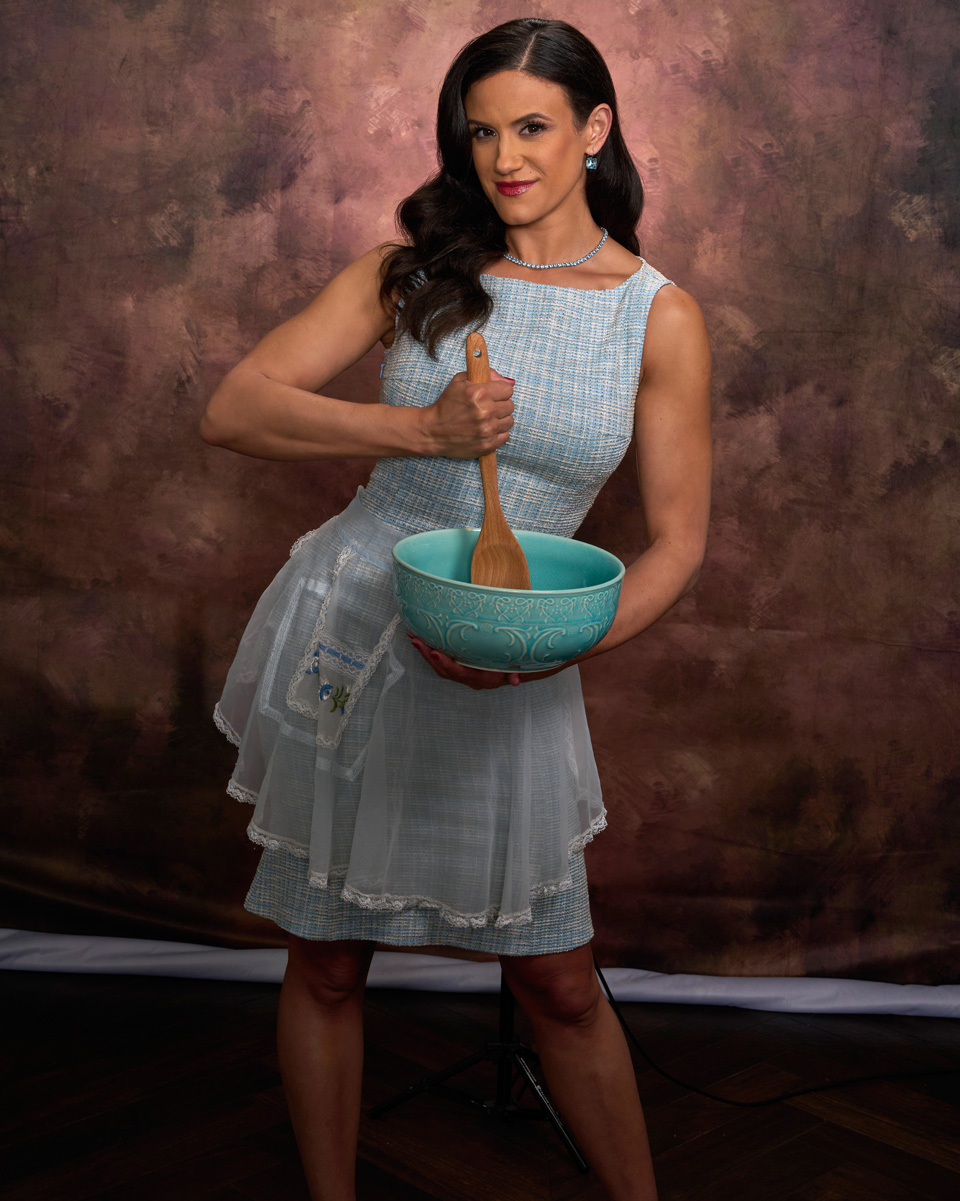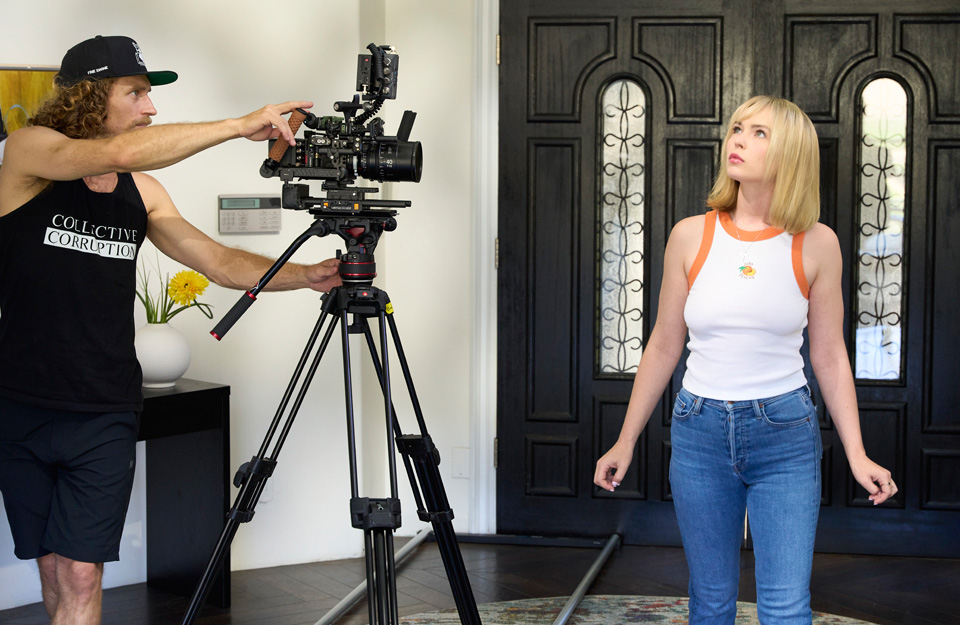Pale, clammy and shaking, Lilly Bell walks out of the bathroom.
“I’m ready for my close-up,” she says, still in character.
Bell is shooting a scene for “The Secrets We Share,” a new feature from Pure Taboo and Adult Time — and moments like this remind the crew that they are not out to make just another adult movie. The goal is to capture something brutal, raw and real: a slow-building scream that explores toxic maternal control, fractured masculinity and the horror of family secrets too disturbing to name.
For the director, acclaimed veteran filmmaker and Adult Time Chief Creative Officer Bree Mills, the film is a chance to follow through on an idea that has been simmering for some months.
“I did a feature earlier this year about a bad dad, and I knew I wanted to do my big Pure Taboo feature this year about a really, really bad mother,” Mills says. “And there was no question I wanted to work with Penny Barber in that capacity.”
Barber, known for her commanding screen presence and deep affinity for taboo narratives, anchors the film as Margaret, a coldly manipulative matriarch whose oppressive influence pushes her stepson John to the edge of a psychological break.

“This role could have been written for me,” Barber says. “Margaret is just the worst. She gets off on playing favorites with her stepsons and seeing just how far they’ll go — because they both love and hate her.
“There’s a subversive passion that comes with these abusive, faux-incestuous relationships,” she adds. “While I wouldn’t want to experience it in real life, I find it darkly alluring in fantasy.”
Mills admits that she did indeed write the film with Barber in mind.
“She’s the undisputed ‘dommy mommy’ in the business,” Mills affirms. “We often kind of spark when we’re working together — just shooting ideas back and forth on ‘How dark can you go?’”
While the movie naturally includes explicit scenes, Mills emphasizes that her intent is to let the emotional dysfunction take center stage.
“The most taboo thing about this movie is that it’s about a very dysfunctional relationship between a mother and her stepson — and they never have sex,” she reveals. “That’s pretty taboo for a taboo movie.”
Instead, the film leans into the psychological, painting a chilling portrait of emotional isolation and what happens when secrets fester in silence.
“I also wanted to explore incel culture and a lot of the issues that are circulating in Western society these days regarding young men,” Mills notes. “This is really a story about a man on the verge of a kind of psychotic break, and what happens as a result of all of this unraveling.”
The story centers on an outsider: a visiting exchange student named Anna, played by Lilly Bell. Anna enters a seemingly perfect suburban household, only to become entangled in its buried tensions.
“It begins as a classic summer exchange setup and quickly descends into something much darker,” Mills explains. “She’s used as a pawn by different members of the family to serve their own twisted purposes.”
For Bell, the opportunity to work in a leading role under Mills’ direction was both creatively fulfilling and physically taxing.

“This lead role was different from anything else I’ve ever done,” she says. “I just took it very seriously and really cared to give it my all. There were three different times I had to put myself in a crying state of panic. At one point, I even vomited because my method acting was so intense.”
To access those emotions, Bell turned to childhood memories and full-body techniques.
“I thought about standing at the bottom of the stairs wailing as a kid, hoping my parents would come down,” she says. “And I made crying sounds louder and louder until I started crying naturally.”
Which brings us to that moment when she comes out of the bathroom, looking like someone who’s just experienced pure trauma.
Bell does indeed get her close-up, but the film’s emotional centerpiece may ultimately belong to Max Fills. He plays John, a young man consumed by isolation and resentment, which blows up in a climactic scene between his character and Barber’s.

“It was fascinating to see that happen,” Mills says. “We set it up in a way where it could really organically happen, a kind of a fight between them. Max went to a place where you could see a little bit of his nerves. When we filmed that scene, he just lost himself in the moment. He was just killing it and impressed the entire cast. If anything’s going on the nomination reel, it’s going to be that scene.”
Barber echoes the sentiment.
“I’ve never seen Max get to show off his thespian side like this before,” she marvels. “He deserves Best Actor this year. Wait until you see what he does here. You’re going to lose it.”
Fills admits that the intensity of the role was next-level.
“It was a really heavy, emotional script and I knew right away it was going to be technically challenging,” he recalls. “I’d never taken on a true dramatic role before, but I was totally ready for the challenge.”
To access John’s emotional unraveling, Fills relied on a mix of personal memory and immersive method acting.
“I’ve been through some really dark times in my life, and for this role, I mentally put myself back in those places to tap into the character’s pain,” he says. “I didn’t shower much, ate lunch alone and kind of forced myself to stay in a bad mood all day while we were shooting.”

The emotional toll of that process came to a head during one particularly raw moment.
“There were a few scenes where I had to completely lose my composure on camera,” Fills says. “I actually got myself to cry for real, and I had to do it multiple times for different takes. That kind of vulnerability was definitely challenging, especially because I was doing it in front of co-workers I see all the time, people who usually see me in a more goofy or sexy light.”
Despite the pressure, Fills says, the environment on-set helped him thrive.
“I feel like I perform best when the stakes are high and there’s a lot riding on it,” he reflects. “Everyone brought their A-game, and that kind of energy pushes you to go even deeper. I never felt like I was carrying anything alone — it was truly collaborative, and that made all the difference.”
Mills says she deliberately structured the film around the triad of leads: Barber, Bell and Fills.
“Each one of them went down the rabbit hole with me,” she says. “That mutual trust let us create something darker and deeper than the norm.”
For Barber, working with Mills offered a unique combination of structure and creative freedom.
“Bree has mentor energy,” Barber says. “She walks you through every scene beforehand, which most directors don’t. Since she writes, produces and directs, she really cares about getting the best content possible. She has cool big-sister vibes.”

Shot over six days, the production brought together longtime collaborators Michael Vegas and Siouxsie Q as producers, along with a robust crew that included a mainstream production designer and special effects artist. Most of the action takes place inside a single house, chosen both for practical reasons and to heighten the claustrophobic tension in the story.
“We wanted the house to feel like a maze Anna gets stuck in,” Mills says. “The fact that you never really leave the house adds emotional weight to the story.”
John’s bedroom, in particular, becomes a focal point in the film.
“His character is holed up in this corner of the house, watching and plotting,” Mills says. “We stylized his space to reflect that — kind of feral and messy.”
The supporting cast includes Axel Haze, Tyler Crews and veteran Charles Dera, a recurring figure in the Pure Taboo canon. Each actor plays a specific role in the web of dysfunction: the overachieving intellectual, the golden boy jock, the calculating patriarch.
Barber says the casting felt seamless.
“I honestly couldn’t tell if she wrote the characters for each actor or if it’s just really, really well cast,” she says. “Either way, it works.”
For Mills, the heart of “The Secrets We Share” lies in its refusal to offer easy catharsis.
“On the surface, it’s a movie about a bad mom — but really it’s about the consequences of emotional isolation,” she says. “Communication is becoming harder and harder for people. There’s more left unsaid than is said. By the film’s climax, we see what happens to people when all those dark things get bottled up.”
With its complex performances, emotional weight and narrative ambition, “The Secrets We Share” is designed not just to titillate, but to haunt.
“Hopefully, people walk away thinking, ‘I can’t believe this was a porno,’” Mills says. “So even if they didn’t get off, they can’t stop thinking about it.”










